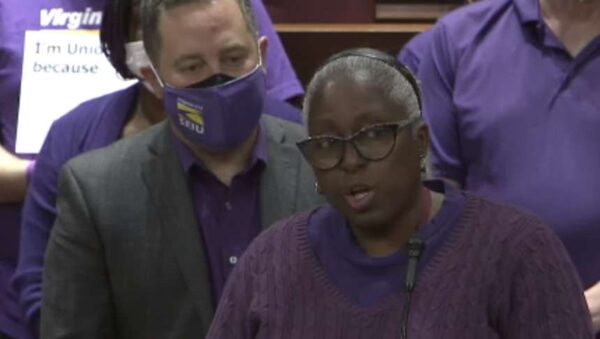
Karen Johnson commutes two hours each way to get to work in Fair Oaks, leaving at 5 a.m. from her home in Fredericksburg.
Johnson, a child care center teacher, has tried to live in Fairfax County but can’t afford it, she said on April 12 at a budget hearing with fellow union members. She called on the Board of Supervisors to fund proposed raises to the county’s 11,000-plus merit workers.
“The pay we receive every two weeks is a stress day for me because it’s a balancing act,” Johnson said. “Rents are downright outrageous, and the cost of living has soared.”
With labor groups and workers raising concerns about the cost of living in Fairfax County, the average vacancy rate across the government was 15%, representing 2,125 openings, as of March 18, according to a budget question-and-answer response to Braddock District Supervisor James Walkinshaw.
According to county staff, county government employees received nearly 8% in market rate adjustments (MRA) over a seven-year period when their compensation plan called for nearly 14%. Public safety got 11.5% in additional raises out of 16% planned, and general county employees got 10.5% out of 14.5% planned.
“It should be noted that the unfunded budget years for merit/performance/longevity increases in the last two years were due to the impact of the COVID-19 pandemic,” staff said in a response to Springfield District Supervisor Pat Herrity.
Service Employees International Union Virginia 512 President David Broder, whose union includes a chapter for Fairfax County government employees, said workers are asking the Board of Supervisors to adopt the pay plan in the proposed budget, which calls for 4.01% MRA increases, merit increases, and longevity raises.
“We’re not asking to get rich,” Johnson said. “But we’re just asking for you to fully fund the raises in the budget…this year so that we can do the job that we love.”
Advocacy groups and residents have pressed for the county to address a variety of priorities in its $4.8 billion general fund budget, from parks funding and affordable housing to relief for rising vehicle and real estate taxes.
Resident Jim McMahon said at a hearing on April 13 that he could face a $3,000 increase in his property bill due to a nearly 20% increase in his assessment, which came after an approximately 15% increase last year.
He asked the board to reconsider the budget, make up for spending increases by reducing other areas, and reduce tax rates. He noted that, thanks to a law from the 1970s, California caps annual assessments at 2% each year.
“They did that so that they could try to give residents the means to continue to be able to afford to live in California, and then they do an adjustment at the sale time to the level of the property tax to the current level,” McMahon said. “But for the residents who are there already, they’re trying to help them.”
The Board of Supervisors’ budget policy committee will meet at 3 p.m. today (Friday) to discuss possible adjustments to the budget. The full budget markup is scheduled for 10 a.m. on Tuesday (April 26).
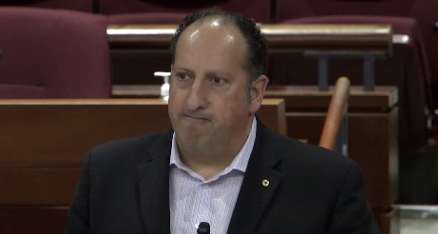
The Fairfax County Sheriff’s Office has 71 vacancies. There are over 200 vacancies at the Fairfax-Falls Church Community Services Board. And that’s not all.
Staff vacancies continue to be a challenge at county agencies across the board, administrators and employee leaders told the Board of Supervisors at budget hearings last week.
“Staffing shortages particularly impact vulnerable populations and lead to increased waiting times for services,” CSB Member-at-Large Anne Whipple said at a hearing on Thursday (April 14).
The county’s proposed budget for fiscal year 2023, which begins July 1, adds 10 positions at the mental health services provider, bringing its total to 1,095 positions if all are filled, but it’s still facing significant shortages.
The advertised budget includes 4.01% raises through market rate adjustments as well as additional merit and performance increases. Uniformed public safety workers also get a 25-year longevity bump.
The county’s $4.8 billion general fund budget includes $79.26 million in unallocated funds and an additional $83 million from vehicle taxes due to soaring market values. County leaders have indicated that some of that money could be used to provide tax relief.
Ron Kuley, president of the Fairfax County Professional Fire Fighters and Paramedics union, asked the board for an additional 4% salary increase for firefighter through lieutenant ranks, costing $6.7 million.
“This would greatly, greatly benefit with the recruitment and retention efforts and would keep us more in line with our comparative jurisdictions,” he said during Thursday’s budget hearing.
He said that’s more important than adding a 25-year longevity step increase, suggesting that the board redirect the $768,000 allocated to the step increase to the raise request.
Kuley said nearly 55 firefighters have left for neighboring jurisdictions in the last two years.
Calls for the county to increase compensation for its workers have also come from unions representing educators and general county employees, who cited inflation, housing costs, and other challenges that make it difficult for them to live in the county.
People can still submit written testimony until April 26, when the Board of Supervisors is scheduled to mark up the budget. The board will adopt a final budget on May 10.
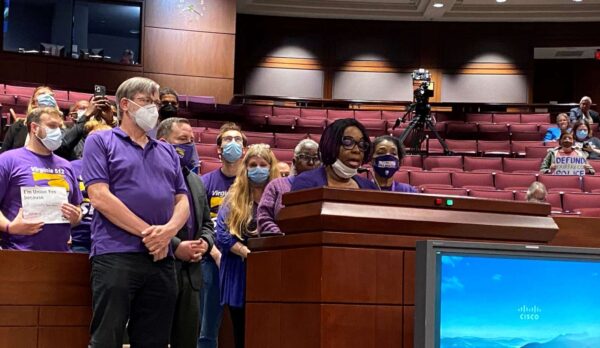
Fairfax County government employees called on the Board of Supervisors to support workers with its new budget amid staff retention issues and financial pressures.
Union representatives discussed the impact of inflation and rising housing and health care costs on their members’ ability to live where they work during public hearings this week on the proposed $4.8 billion budget.
Leslie Houston, a learning disabilities teacher at Braddock Elementary and president-elect of the Fairfax Education Association, said some of her colleagues can’t afford to live and shop in the area.
“In education, we must be about the kids, but that is not possible if we are not taking care of the people who are taking care of the kids,” Houston said.
Janette Corcelius, a teacher who said she lives in the Mount Vernon District with her family, stated that she couldn’t afford to live there on her own even though she’s worked for Fairfax County Public Schools for six years.
“My situation is not unique,” she said. “This is a struggle Millenials and Gen Z come across when trying to live and work in this area. Affordable housing…support is necessary.”
The Fairfax County School Board put forth a $3.3 billion budget plan in February that includes 4% market scale adjustments and step increases for school employees. It will adopt its budget May 26.
The county’s advertised budget for fiscal year 2023, which begins on July 1, would fully fund the school board’s request, which would increase the transferred funds by nearly $112.7 million over last year.
For non-school government employees, the county budget proposes a 4.01% market rate adjustment, adding a 25-year longevity step and providing additional merit and performance increases.
Fairfax Workers Coalition Executive Director David Lyons said most workers are paid well below the midlevel of their pay scales, especially in the trades.
“We are no longer fully competitive in today’s marketplace,” he said. “You need to bring your workers up to scale.”
The Fairfax County Government Employees Union, a chapter of SEIU Virginia 512 that represents sanitation workers, social workers, child educators, and others, requested that the Board of Supervisors protect the plan’s pay increases and lower health care costs for workers.
“The past two years have been unlike anything we’ve ever experienced,” President Tammie Wondong Ware said. “Through it all, your county employees have been on the job, keeping everyone safe.”
Wondong Ware also noted that unions are expected to begin negotiating contracts with the county at the start of the new fiscal year. In a historic shift, the county board agreed last October to allow collective bargaining, but the county is still laying the groundwork to make that happen.
“We look forward to negotiating a contract which ensures…that every year, your workforce receives fair pay, affordable health care, safe staffing levels and healthy workplaces,” Wondong Ware said.
Karen Sheffield, chair of the Employee Advisory Council, which supports over 10,000 employees, said the group applauds the budget’s proposed compensation increases but felt the financial support could go further.
She said many workers are leaving the county government for jobs with better compensation and more options for work-life balance.
“Help us to curtail the exodus,” Sheffield said, calling for a 5.9% market rate adjustment.
The Board of Supervisors will determine how to address competing priorities that range from tax relief and calls to reduce greenhouse gas emissions to pay equity for the public defender’s office at a budget markup meeting on April 16.
The board will adopt the new county budget on May 10.
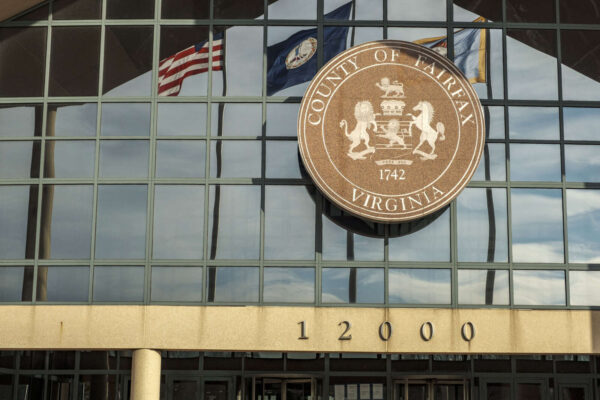
Worker resignations for Fairfax County government positions jumped up nearly 62% from 2020 to 2021, from 507 departures to 821 departures.
Fairfax County leaders are debating how to improve recruitment and retention, citing private-sector wages that created competitive environments for positions from police to information technology.
“These resignations and retirements are trending higher,” Director of Human Resources Cathy Spage said yesterday (Tuesday) during a personnel committee meeting. “I will say that they were trending higher before the pandemic. They just started accelerating their trend pretty much starting in 2021.”
Dranesville District Supervisor John Foust noted that Maryland recently ended its four-year-college-degree requirements for many jobs. The Old Line State estimates that more than half of its over 38,000 positions can substitute a four-year degree with experience, training, or community college education.
Foust recommended that Fairfax County reevaluate its criteria for different positions, which could have been established decades ago in some cases.
Different factors mean different agencies across the regional government require different solutions, County Executive Bryan Hill said.
“We’ve seen the attrition rate for public safety rise dramatically over the last couple years,” said Tom Arnold, the deputy county executive for safety and security.
Resignations in public safety have increased from 87 positions in 2018 to 129 departures in 2021, while retirements have increased every year during that time frame, from 96 to 141.
“Over the first two months of this calendar year, we’ve seen a much higher attrition rate…within public safety, comparable to…health and human services or others, but I think the scariest part of that is, many of those exits are to the private sector,” Arnold said.
As agencies have raised starting salaries to compete, additional challenges could arise from the resulting inequities between pay for new staff and existing staff, he noted. Read More

The unionization wave sweeping through Starbucks across the country has arrived in Fairfax County.
Workers in Merrifield (3046 Gate House Plaza) and Springfield (7475 Huntsman Boulevard) have filed for union elections, joining a cafe in Leesburg as the first unionizing stores in Northern Virginia, Starbucks Workers United confirmed.
As of yesterday (Tuesday), 140 stores in 27 states have filed for elections since workers in Buffalo, New York, voted to form the union in December.
The Springfield store filed a petition with the National Labor Relations Board on Feb. 23, and the Merrifield store went public with its plan to unionize with Workers United last week, earning a shoutout from Providence District Supervisor Dalia Palchik.
Workers officially filed for an election on Friday (March 11) after distributing union cards and sending a letter of intent to Starbucks CEO Kevin Johnson, Merrifield employee and organizing committee member Claudia Sol told FFXnow.
“Ultimately what motivates me towards unionization is the fact that the driving force behind a company’s profit is the worker,” Sol said. “To me, it’s absurd that the company refers to us as partners when we don’t have any say on policies that directly affect us and the work we do.”
My local Starbucks has filed for union elections! Getting in line for a latte tomorrow. https://t.co/M5rjU4AqWU
— Dalia Palchik (@DaliaPalchik) March 10, 2022
First hired by Starbucks in November 2019, Sol says she loves her job, coworkers, and interacting with regular customers, even returning to the store in October after initially quitting in June 2021.
However, she describes the work environment as fast-paced, unpredictable, and both physically and mentally stressful. The COVID-19 pandemic has particularly exacerbated challenges with staffing and health and safety standards, she says. Read More
Fairfax County plans to hire a neutral observer this year who will help handle activities involving county government workers’ unions.
Although unions can move ahead with elections now, groups appear content to wait for the labor relations administrator to be in place.
“The labor relations administrator will be the neutral person, so they don’t work for us. They don’t work for any of the employee groups,” Fairfax County Human Resources Director Cathy Spage told the Board of Supervisors Tuesday (Feb. 1) at a Personnel and Reorganization Committee meeting. “They’re going to be like a judge.”
The person will be tasked with establishing and publishing union vote procedures and overseeing secret ballot elections, among other duties. Fairfax County government plans to use a contractor for the position and will accept proposals from Wednesday (Feb. 9) through March 9.
The Board of Supervisors could approve the new position on May 24, allowing the administrator to start this summer for a four-year term.
The county approved a historic ordinance in October allowing public-sector unions to negotiate wages, benefits, and working conditions on the behalf of county government employees.
The move was made possible by a 2020 General Assembly law that overruled a 1977 state Supreme Court decision barring public workers from collective bargaining.
According to the ordinance, if a union seeks to hold an election before the labor relations administrator is in place, the county would secure services from an impartial agency provider, such as the American Arbitration Association or another group.
As of Tuesday (Feb. 1), no union filings have begun. Units representing police, fire and general county government employees will be allowed to collectively bargain.
“Right now we are not ready to do elections,” Spage said. “We haven’t received any petitions to do elections.”
Following an election, a union acting as the exclusive bargaining agent must start contract negotiations on or before July 1 and conclude by Oct. 15 in order for an agreement to be in place for the next fiscal year.
That means the first collectively bargained agreement for Fairfax County government workers could take effect on July 1, 2023.

Fairfax County is working on ways to ensure that consistent and fair wages are linked to public construction contracts.
At a board meeting on Tuesday (Jan. 25), the Fairfax County Board of Supervisors voted unanimously to require all public construction contracts to abide by the prevailing wage — the hourly rate paid to most workers in specific niche coasts or in a labor market area.
The county was able to pass the measure after the Virginia General Assembly adopted enabling legislation in 2020 that went into effect in May of last year.
“Increasing protection of workers’ rights and ensuring that people are paid appropriately for their skills benefits not just those workers, but the community-at-large,” Board Chairman Jeff McKay told FFXnow. “Our county invests a lot of resources into our community to help struggling residents. Workers getting a fair wage helps families towards a path of self-sufficiency and into the middle class, which helps the entire community.”
Localities are allowed to adopt ordinances that require construction contracts to pay wages for their bidders, contractors, offers, and subcontractors at the prevailing wage rate.
The rate is determined by the Commonwealth’s Commissioner of Labor and Industry, which is guided by standards set by the U.S. Secretary of Labor.
County staff worked with stakeholders and professional cost estimators from the region in order to determine the impact of adopting the ordinance on construction costs. The workgroup helped the county formulate the ordinance that passed on Tuesday.
Such ordinances could have a disproportionate impact on small, women or minority-owned businesses. Other contractors and subcontractors may lack the administrative capacity to absorb the costs associated with the ordinance, a county memo noted.
However, the ordinance could level the playing field for all contractors by taking wages out of the equation, according to county staff. Minority businesses may be able to compete for county contracts, which may be underbid by low-road competition that is not from the area.
The county is working on ways to make sure that businesses have administrative support like software and resources in order to comply with the ordinance.
But it’s still unclear how adopting a prevailing wage affects construction project costs, according to county staff.
The Virginia Division of Engineering and Buildings, for example, accounts for a budget impact of 15% for construction costs. The cost impact can vary between 5 and 7.5% depending on the project type, according to the county.
Based on the county’s unique needs, the ordinance would increase costs by around 5%.
The ordinance goes into effect on July 1.
The state’s prevailing wage law — known as the Little Davis-Bacon Act — went into effect in May. The law requires contractors and subcontractors with contracts over $250,000 to pay the prevailing wage and benefits to all employees who are a part of that contract.
Contractors must verify the pay scale used for employees under the public contract. Itemization of the amount paid to workers is provided and payment records are verified.
If contractors fail to follow the law, the prevailing page must be paid, in addition to an annual interest rate of 8% that accrues when wages were first due.
The contractor is disqualified from bidding on all public contracts until workers are paid. Arlington County also has a prevailing wage ordinance.
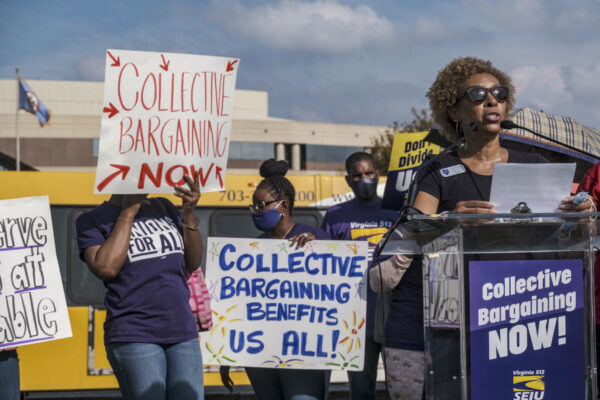
Fairfax County Public Schools is moving to give its workers collective bargaining powers.
An FCPS webpage launched Friday (Dec. 17) explains that the school system is developing an ordinance establishing the scope and rules of collective bargaining, which will enable labor unions to negotiate pay, benefits, and working conditions for their members.
Work on the proposed draft ordinance is expected to continue until the end of January. The text could be released for public comment in February or March, Fairfax Education Association President Kimberly Adams told FFXnow.
A union representing FCPS teachers and support staff, including bus drivers, custodians, nurses, and cafeteria workers, the FEA says it is confident that the school board will adopt an ordinance allowing collective bargaining.
“We have waited for 44 years, and the time is now to pass a strong ordinance,” Adams said in a statement. “Our students’ learning conditions are our working conditions and we want to remain the school district that people love to work and learn in.”
Local government workers in Virginia had been prohibited from collective bargaining since 1977 until the General Assembly passed legislation allowing localities to authorize the practice during its spring 2020 session.
The Fairfax County Board of Supervisors approved an ordinance for general county government employees on Oct. 19, but FCPS needs to create a separate policy for its employees. The school system has 24,839 full-time workers, according to its website.
The state law still prohibits government workers from striking, and even if FCPS adopts a collective bargaining ordinance, union membership won’t be required for employees, since Virginia remains a right-to-work state.
FCPS says it’s unclear how the introduction of collective bargaining will affect current employees and their pay, but the process for negotiating agreements in the future will be aligned with the school system’s annual budget timeline.
The Fairfax County Federation of Teachers, a union open to all FCPS teachers and other non-administrative, non-supervisory employees, says it has been working with FCPS to develop a resolution “that is inclusive and flexible for all members” since the 2020 Virginia law took effect on May 1.
“Throughout our sessions our bargaining team has fought for a broad and open bargaining scope that helps to establish school staff’s right to negotiate hours and scheduling, compensation, health, retirement, all working conditions and other benefits,” FCFT President Tina Williams said by email. “As we bargain to build power in our county, we will continue to fight to guarantee our members’ voices are included throughout the entirety of the process.”
The FEA and FCFT are among several school employee organizations in a collective bargaining work group created by FCPS earlier this year. The group convened for the first time on Sept. 30 and is expected to continue meeting every few weeks through January.
“FEA has been at each session, ready to advocate for our member’s needs and build partnerships that achieve our interests,” Adams said. “We look forward to the final draft and a strong vote from our school board.”

(Updated at 6:45 p.m.) Scores of people called on Fairfax County to adopt a more robust collective bargaining policy for county government workers at a Board of Supervisors public hearing on a proposed ordinance yesterday (Tuesday).
At a rally before the public hearing and at the meeting itself, labor union representatives and other speakers stated that they want more workers to be eligible to participate in collective bargaining, more ability to negotiate working conditions, and more flexibility in discussing labor issues while they’re at work.
“This is a defining moment,” Fairfax County Federation of Teachers president Tina Williams said during yesterday’s public hearing. “Fairfax County can set the standard in Virginia.”
Williams and Fairfax Education Association President Kimberly Adams were among the educational leaders who gave their support to a county ordinance, even though it would not cover school employees. Fairfax County Public Schools needs to adopt a policy separately.
Fairfax County has spent months developing collective bargaining procedures after the Virginia General Assembly broke from a 1977 state Supreme Court ruling that banned public-sector unions from collectively bargaining. The legislature approved a law in April 2020 that gives localities the authority to develop ordinances to permit collective bargaining if they choose to do so.
County leaders have expressed support for collective bargaining, which is already permitted for government workers in most states as well as D.C. Some neighboring jurisdictions, including Arlington and the City of Alexandria, adopted their own ordinances earlier this year.
With labor groups representing a wide range of workers, from firefighters and police to public works, nurses, librarians, and social workers, weighing in, the Board of Supervisors decided to defer a vote on the ordinance to its next regular meeting on Oct. 19.
Board Chairman Jeff McKay said the postponement will let supervisors to absorb the testimony and respond to speakers’ requests to take more time on the matter. Written comments will continue to be accepted as part of the public hearing.
Most speakers during the hours-long hearing came in support of an ordinance, though a few raised concerns about the implications the matter would have on taxpayers.
The county projects that the ordinance will carry $1.9 million in annual costs to handle increased workloads.
At least nine full-time equivalent employees and additional support positions will be needed to address new work involving labor relations, legal support, policy administration, contract compliance and administration, according to a county staff report.
While there was broad support for collective bargaining, labor groups and other stakeholders voiced concerns about the most recent draft of the proposed ordinance. Read More

